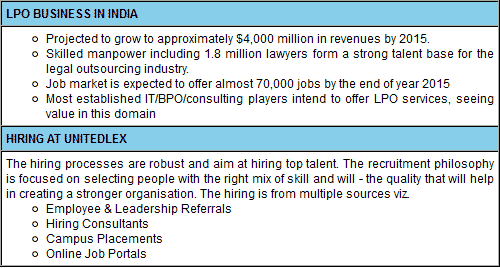 | « Back to article | Print this article |
Legal Process Outsourcing: The hot new career in law
Through legal Process Outsourcing, law professionals can help their clients maintain profitability and reduce risk by standardising the legal work in a project-oriented manner. Read on to know how you can pursue a career in it
The paradigms of choosing a career are changing and so are the opportunities in the market.
Likewise, law students are now not wary of exploring non-traditional careers to make a mark in their professional lives.
The Legal Process Outsourcing (LPO) has emerged as the new-age career option for many.
Legal services in demand, globally
The global spend on legal services has increased dramatically in the last few years and this in turn, has made the in-house legal departments and law firms very cognizant of keeping a check on cost and quality while delivering large work volumes.
This is where the LPO companies come into picture, helping their clients maintain profitability and reduce risk by standardising the legal work in a project-oriented manner and putting a process around it.
The evolving model of the LPO industry has shown notable connection and coordination between corporations, LPO vendors and law firms.
The competitive advantages that LPOs provide are numerous.
While they are time and resource-intensive and have the capability to handle low to mid-complexity work, their technology -oriented solutions offer increased scalability and efficiency.
Range of services
As per a research by Business Wire, the global LPO market was estimated to be worth $2.4 billion in 2012 and is growing at a rate of 28 per cent annually.
LPO is also the fastest growing sub-sector in the Knowledge Process Outsourcing (KPO) domain.
Looking at this growth rate, the work opportunities that an LPO provides are diverse.
While LPOs do some very high-end complex work ranging from legal research, drafting and analytics, they are capable of providing support with legal back-end operations.
The perception of an LPO was a bit different few years back but not anymore.
They have moved up the value chain by delivering quality work to clients by means of high-powered technology and business solutions and are now perceived to be business partners, not just outsourcing vendors.
Some LPOs deliver economies of scale and knowledge through right-shore delivery platforms working very closely with client base across domains.
The established LPOs work across diverse work streams providing a wide exposure of operations like litigation support, corporate legal support -- contract management M&A due diligence, intellectual property and ancillary services.
Some of these are extremely strategic and specialised work areas.
Please click NEXT to continue reading...
How GenNext can benefit from the career
LPO is an emerging career option for the next generation lawyers.
While law college graduates may explore law firms, in-house legal departments and litigation and then consider working in an LPO, the opportunities created in this area are limitless and quite motivating.
Standardising processes and assigning a structure to complex legal work can be quite a motivating factor for law graduates who love to innovate and break out of the clutter.
The opportunity to work across different lines of business for customers across different parts of the world and exposure to multinational way of working is the unique proposition that LPOs have come to offer.
For instance, UnitedLex associates work with Fortune 500 and Amlaw 200 Client Base early in their career and this international exposure is matchless.
LPOs have been providing support across a wide array of services that range from administrative work (contract abstraction, patent proofreading, and litigation coding) to higher complexity services (eDiscovery analytics, litigation readiness assessments, collections, expert witness services, patent drafting, patent analytics services, contract negotiations, obligation management).
In fact, LPOs have also been exploring non-traditional services like loan processing, litigation financing etc. to expand their area of operations.
How is it different from a conventional law career?
Working in a legal outsourcing company is an exposure to a world class culture that introduces you to an unmatched opportunity of working with global clients and learning international best practices.
A typical day at work would involve working for clients across the world on diversified projects in a corporate environment (with a five-day working week and mostly day shifts).
Employees in many projects are a single point of contact for the client and also get to be a part of the employee exchange programme across geographies.
They also successfully migrate/transition international projects to India while working on global assignments.
LPOs thrive on cutting edge technology and working on some of the proprietary LPO technology platforms takes the experience to the next level.
How to get hired
Employee skill development and training programmes are also a strong focus at LPO companies.
Apart from these, some other benefits are better work-life balance, enhanced reward and recognition programmes, and opportunity to work across domains by means of Internal Job Postings (IJPs).
LPOs also offer lawyers a wide array of roles that help individuals learn the nuances of team management, thus shaping them to be the leaders of tomorrow.
As more and more industry experts from the globally known firms endorse the LPO industry, one can only hope for the demand in LPO careers increasing over time.
It is boom time for this industry that is poised for success relying on forward looking growth rates, diversity of opportunity and a truly multinational culture.

How to get hired
A specialised approach is to look at the cohesive involvement of both Talent Acquisition Group and Business vertical while recruiting employees.
The LPOs' competency-based hiring programmes help in selecting the right match of competencies required for the job role.
For domains like Contract Solutions, there are a defined set of contract domain competencies.
The hiring processes are robust, extensive and aimed at engaging with the candidate on a personal level during the entire recruitment life cycle to make the candidates better acquainted with the business processes, culture and operations.
Internships are also provided to law students.


